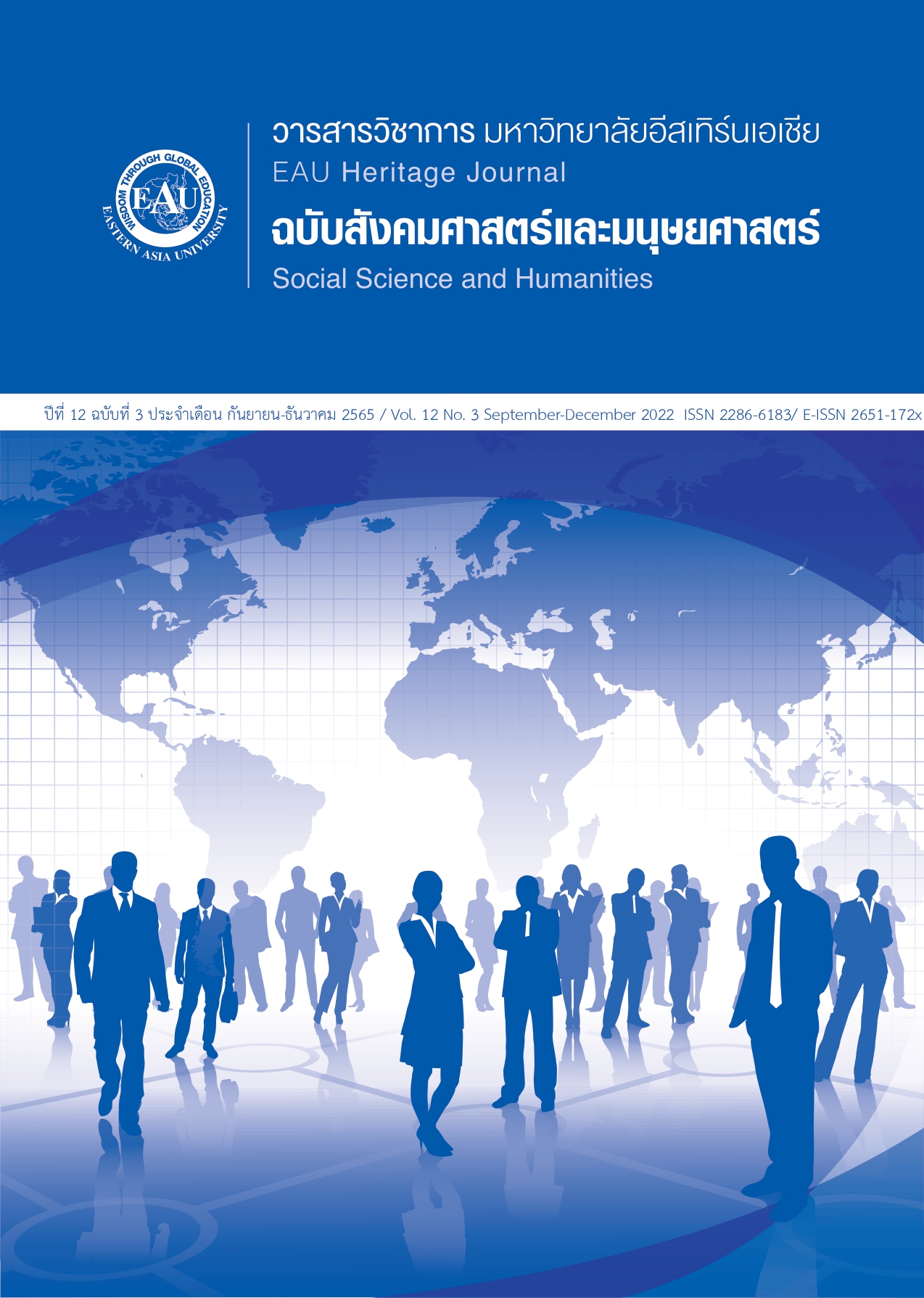Relationship between Management Accounting Competency Affected Operational Efficiency of New S-Curve Company with Strategic Management Accounting as a mediator
Keywords:
Management Accounting Competency, Strategic Management Accounting, Operational EfficiencyAbstract
The objective of this study is to examine the relationship between management accounting competency and operational efficiency of a New S-Curve company with strategic management accounting: SMA as a mediator. The sample in this research is a group of 400 New S-Curve companies. Questionnaires were sent by email. The frequency, percentage, and mean were used as statistics. The multiple regression analysis was used as a hypothesis test. The research findings indicate that management accounting competency including strategy planning and performance, reporting and control, and technology and analytics affect operational efficiency and SMA mediates the relationship between management accounting competency and operational efficiency as a partial mediator. In addition, professional ethics and values and tax and law affect operational efficiency and SMA mediates the relationship as a perfect mediator.
References
Dang, L., Le, T., & Pham, T. (2021). The effect of strategic management accounting on business
performance of sugar enterprises in Vietnam. Accounting, 7(5), 1085-1094.
Ugrin, J. C., Odom, M. D., Honn, D. D., & Rose, A. M. (2021). The Effects of Collaborative Simulation on the Development of Students'
Confidence in Managerial Accounting Skills. Issues in Accounting Education, 36(2), 43-63.
Thongkua, C., & Promyoo, T. (2020). Innovation Factors Impacting Thai Border Trading Business in Ranong. Journal of Innovation and Management, 5, 31-42. (in Thai)
Phornlaphatrachakorn, K. (2019). Influences of strategic management accounting on firm profitability of information and communication technology businesses in Thailand. International Journal of Business Excellence, 17(2), 131-153.
Wajdi, F., & Arsjah, R. J. (2019). The influence of organizational capabilities, strategic management accounting on organizational performance mediated by competitive advantage in companies in Indonesia. Research Journal of Finance and Accounting, 10(22), 141-151.
Thongdeepan, N., & Srichanapun, P. (2019). The ability to use management accounting
information of the business in Lampang Province. Journal of Modern Management
Science, 12(1), 135-147. Retrieved from https://so03.tci- thaijo.org/index.php/JMMS/article/view/198970/138731 (in Thai)
Sundaravibhata, S. (2019). The Causal Factors Affecting to Strategic Management Accounting of Management Accountant in Stock Exchange of Thailand in Driving Firm. The Journal of Pacific Institute of Management Science (Humanities and Social Science), 5(1), 83-105. (in Thai)
IMA. (2019). IMA management accounting competency framework. Institute of Management Accounting Buffalo, NY, USA
Guergoson, K., & Vichit, U. (2019). Casual Factors Affecting to Market Readiness Assessment and
Business Performance of small and Medium Enterprise (SMES) in Thailand.
Ditsathien, K. (2019). The qualification and knowledge framework of management accountants in Thailand. Journal of Federation of Accounting Professions, 1(1), 32-42. (in Thai)
Lay, T. A., & Jusoh, R. (2017). Organizational capabilities, strategic management accounting and firm performance. Jurnal Akuntansi Dan Keuangan Indonesia, 14(2), 6.
Cadez, S., & Guilding, C. (2012). Strategy, strategic management accounting and performance: a configurational analysis. Industrial Management & Data Systems.
Al‐Mawali, H., Zainuddin, Y., & Ali, N. N. K. (2012). Customer accounting information usage and organizational performance. Business Strategy Series, 13(5), 215-223.
Martusa, R., & Dicky, Y. (2011). Penerapan Activity Based Costing (Abc) System Dalam
Penghitungan Profitabilitas Produk. Jurnal Akuntansi, 3(1).
Cadez, S., & Guilding, C. (2008). An exploratory investigation of an integrated contingency model of strategic management accounting. Accounting, organizations and society, 33(7-8), 836-863.
Burney, L., & Widener, S. K. (2007). Strategic performance measurement systems, job‐relevant information, and managerial behavioral responses—Role stress and performance. Behavioral research in accounting, 19(1), 43-69.
Hair Jr, J. F. (2006). Successful strategies for teaching multivariate statistics. Proceedings of the 7th International Conference on,
Foxall, G. R., & Yani-de-Soriano, M. M. (2005). Situational influences on consumers' attitudes and behavior. Journal of Business research, 58(4), 518-525.
Guilding, C. (1999). Competitor-focused accounting: an exploratory note. Accounting, organizations and society, 24(7), 583-595.
Chenhall, R. H., & Langfield-Smith, K. (1998). The relationship between strategic priorities, management techniques and management accounting: an empirical investigation using a systems approach. Accounting, organizations and society, 23(3), 243-264.
Penafort, F., & Ahmad, B. B. (1997). Employers' Expectations on Today's Accounting Profession: A Malaysian Case‐Study. Asian Review of Accounting.
Abernethy, M. A., & Guthrie, C. H. (1994). An empirical assessment of the “fit” between strategy and management information system design. Accounting & Finance, 34(2), 49-66.
Barney, J. (1991). Firm resources and sustained competitive advantage. Journal of management, 17(1), 99-120.
Nunnally, J., & Bernstein, I. (1994). Psychometric Theory (3rd ed.). New York: MacGraw-Hill In.
Belsley, D. A. (1991). A guide to using the collinearity diagnostics. Computer Science in Economics and Management, 4(1), 33-50.
Baron, R. M., & Kenny, D. A. (1986). The moderator–mediator variable distinction in social psychological research: Conceptual, strategic, and statistical considerations. Journal of personality and social psychology, 51(6), 1173.
Simmonds, K. (1982). Strategic management accounting for pricing: a case example. Accounting and Business Research, 12(47), 206-214.
Rovinelli, R. J., & Hambleton, R. K. (1976). On the use of content specialists in the assessment of criterion-referenced test item validity.
Yamane, T. (1973). Statistics: An introduction analysis. Harper & Row.
Department of Industrial Works. (2563). CD factory list in 2020. [CD-ROM]. Bangkok: Department
of Industrial Works. (in Thai)
Henklang, P. (2561). The relationship between Strategic Management Accounting implementation and Managerial Performance. Rajamangala University of Technology Phra Nakhon. (in Thai)
Pimpaporn Puengboonpanich. (2560). The Arrangement Trend Of Managerial Accounting Research. Journal of MCU Social Science Review, 6(4), 72-86. Retrieved from file:///C:/Users/AiVisionUser1/Downloads/jomcusoc,+%7B$userGroup%7D,+72-86.pdf (in Thai)
Boonma, D. (2559). Relationship Between Factor Affected Corporate Entrepreneurship and Employee Performance, The role of Corporate Entrepreneurship as a mediator and job tenure as a moderator. Burapha University (in Thai)
Pongsirapop Thongdeerawisuraket. (2555). Competencies of Professional Accountants: A Perspective from Accounting Managers in Enterprises Located in the Industrial Estate Authority of Thailand. Dhurakij Pundit University. Retrieved from http://libdoc.dpu.ac.th/thesis/145574.pdf (in Thai)
Krung Thai Bank. New target industry Driving economic mechanisms for the future.
Retrieved from https://sme.krungthai.com/sme/productListAction.action?command=getDetail&cateMen u=KNOWLEDGE&cateId=42&itemId=238# (in Thai)





